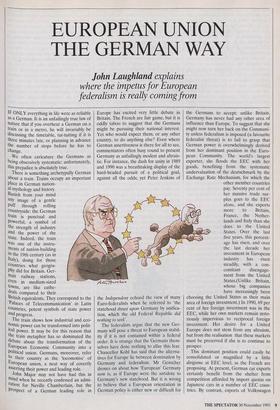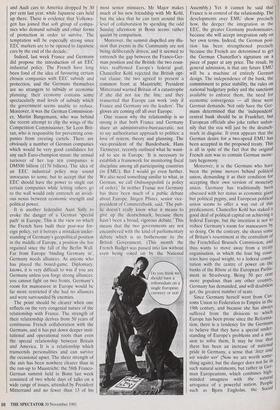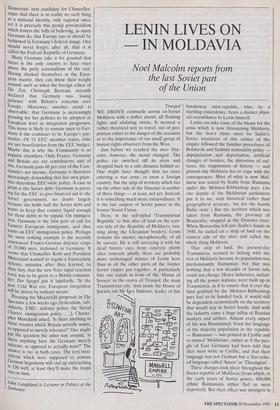EUROPEAN UNION THE GERMAN WAY
John Laughland explains
where the impetus for European federalism is really coming from
IF ONLY everything in life were as reliable as a German. It is an unfailingly true law of nature that if you overhear a German on a train or in a metro, he will invariably be discussing the timetable, tut-tutting if it is three minutes late, or planning in advance the number of stops before he has to change.
We often caricature the Germans as being obsessively systematic: unfortunately, this prejudice is absolutely true.
The train shows how industrial and eco- nomic power can be transformed into polit- ical power. It may be for this reason that the train metaphor has so dominated the debate about the transformation of the European Economic Community into a Political union. Germans, moreover, refer to their country as the 'locomotive' of European union, a neat way of covertly asserting their power and leading role. John Major may not have had this in mind when he recently confessed an admi- ration for Neville Chamberlain, but the Prospect of a German leading role in Europe has excited very little debate in Britain. The French are fair game, but it is oddly taboo to suggest that the Germans might be pursuing their national interest. Yet who would expect them, or any other country, to do anything else? Even where German assertiveness is there for all to see, commentators often busy round to present Germany as unfailingly modest and altruis- tic. For instance, the dash for unity in 1989 and 1990 was a breathtaking display of the hard-headed pursuit of a political goal, against all the odds; yet Peter Jenkins of the Independent echoed the view of many Euro-federalists when he referred to 'the statehood thrust upon Germany by unifica- tion, which the old Federal Republic did nothing to seek'.
The federalists argue that the new Ger- many will pose a threat to European stabil- ity if it is not contained within a federal order. It is strange that the Germans them- selves have done nothing to allay this fear. Chancellor Kohl has said that the alterna- tives for Europe lie between domination by Germany and federalism. Mr Genscher drones on about how 'European' Germany now is, as if Europe were the antidote to Germany's new statehood. But it is wrong to believe that a European orientation in German policy is either new or difficult for
the Germans to accept: unlike Britain, Germany has never had any other area of influence than Europe. To suggest that she might now turn her back on the Communi- ty unless federalism is imposed (a favourite federalist threat) is to fail to grasp that German power is overwhelmingly derived from her dominant position in the Euro- pean Community. The world's largest exporter, she floods the EEC with her goods, benefiting from the systematic undervaluation of the deutschmark by the Exchange Rate Mechanism, for which the other member countries pay. Seventy per cent of her massive trade sur- plus goes to the EEC alone, and she exports more to Britain, France, the Nether- lands and Italy than she does to the United States. Over the last five years, this percent- age has risen, and over the last decade her investment in European industry has risen steadily, with a con-
comitant disengage- ment from the United States.(Unlike Britain, whose big companies have increasingly been choosing the United States as their main area of foreign investment.) In 1990, 69 per cent of her foreign investment was in the EEC, while her own markets remain noto- riously impervious to reciprocal foreign investment. Her desire for a United Europe does not stem from any altruism, but from the realisation that these markets must be preserved if she is to continue to prosper.
This dominant position could easily be consolidated or magnified by a little dirigisme at EEC level, as the French are proposing. At present, German car exports certainly benefit from the shelter from competition afforded by import quotas on Japanese cars in a number of EEC coun- tries. By contrast, exports of Volkswagen and Audi cars to America dropped by 30 per cent last year, while Japanese cars held up there. There is evidence that Volkswa- gen has joined that soft group of compa- nies who demand subsidy and other forms of protection in order to survive. The temptation will be especially strong since EEC markets are to be opened to Japanese cars by the end of the decade.
Indeed, last week France and Germany did propose the introduction of an EEC industrial policy. The French have long been fond of the idea of favouring certain chosen companies with EEC subsidy and protection, and the Germans themselves are no strangers to subsidy or economic planning: their economy contains some spectacularly mad levels of subsidy which the government seems unable to reduce. Moreover, it was the German Commission- er, Martin Bangemann, who was behind the recent attempt to clip the wings of the Competition Commissioner, Sir Leon Brit- tan, who is responsible for preventing com- panies from creating cartels. There are obviously a number of German companies which would be very good candidates for any such Euro-champion status: the annual turnover of her top ten companies is DM500 billion (£170 billion). The idea of an EEC industrial policy may sound innocuous to some, but to accept that the EEC should have the power to single out certain companies while letting others go to the wall would only entrench an invidi- ous nexus between economic strength and political power.
It is another federalist Aunt Sally to evoke the danger of a German 'special path' in Europe. This is the view on which the French have built their post-war for- eign policy, yet it betrays a mistaken under- standing of Germany's geopolitical position in the middle of Europe, a position she has regained since the fall of the Berlin Wall. Far from Europe 'binding Germany in', Germany needs alliances. As anyone who has played the board-game, Diplomacy, knows, it is very difficult to win if you are Germany unless you forge strong alliances: you cannot fight on two fronts. Germany's room for manoeuvre in Europe would be far more restricted if she had no alliances and were surrounded tiy enemies.
The point should be clearer when one reflects on the very congenial nature of the relationship with France. The strength of their relationship derives from 50 years of continuous French collaboration with the Germans, and it has put down deeper insti- tutional and operational roots than even the special relationship between Britain and America. It is a relationship which transcends personalities and can survive the occasional upset. The sheer strength of the axis has been nowhere clearer than in the run-up to Maastricht: the 58th Franco- German summit held in Bonn last week consisted of two whole days of talks on a wide range of issues, attended by President Mitterrand and no fewer than 13 of his most senior ministers. Mr Major makes much of his new friendship with Mr Kohl, but the idea that he can turn around this level of collaboration by spending the odd Sunday afternoon in Bonn seems rather quaint by comparison.
Moreover, the summit dispelled any illu- sion that events in the Community are not being deliberately driven, and it seemed to entrench the gap between the Franco-Ger- man position and the British: the two coun- tries reaffirmed Europe's federal goal; Chancellor Kohl rejected the British opt- out clause; the two agreed to present a common front at Maastricht; President Mitterrand warned Britain of a catastrophe if she did not toe the line; and they reasserted that Europe can work 'only if France and Germany are the leaders'. The gloves are coming off all over Europe.
One reason why the relationship is so strong is that both France and Germany share an administrative-bureaucratic, not to say authoritarian approach to politics: a love of system, theory and planning. The vice-president of the Bundesbank, Hans Tietmeyer, recently outlined what he want- ed to see in Europe: 'It is necessary to establish a framework for monitoring fiscal discipline among all participating countries (in EMU). But I would go even further. We also need something similar to what, in German, we call Ordnungspolitik (a policy of order).' In neither France nor Germany has there been much of a public debate about Europe. Jurgen Pfister, senior vice- president of Commerzbank, said, 'The pub- lic doesn't really know what it means to give up the deutschmark, because there hasn't been a broad, vigorous debate.' This means that the two governments are not encumbered with the kind of parliamentary debate which is so bothersome to the British Government. (This month the French Budget was passed into law without even being voted on by the National Assembly.) Yet it cannot be said that France is in control of the relationship. The developments over EMU show precisely how, the deeper the integration in the EEC, the greater Germany predominates, because she will accept integration only on her own terms. Indeed, the German posi- tion has been strengthened precisely because the French are determined to get the German Chancellor's signature on a piece of paper at any price. The result, by general admission, is that any future EMU will be a machine of entirely German design. The independence of the bank, the commitment to price stability, the rules on national budgetary policy and the sanctions available to enforce them, the need for economic convergence — all these were German demands. Not only have the Ger- mans determined that the 'independent' central bank should be in Frankfurt, but European officials also joke rather unfun- nily that the ecu will just be the deutsch- mark in disguise. It even appears that the German desire for a two-speed EMU has been accepted in the proposed treaty. This is all in spite of the fact that the original French aim was to contain German mone- tary hegemony.
Moreover, it is the Germans who have been the prime movers behind political union, demanding it as their condition for accepting their own version of monetary union. Germany has traditionally been obsessed with her status as economic giant but political pygmy, and European political union seems to offer a way out of this predicament. Chancellor Kohl has staked a good deal of political capital on achieving a federal Europe, but the intention is not to reduce Germany's room for manoeuvre by so doing. On the contrary, she shares some of Britain's resentment at the centralism of the Frenchified Brussels Commission, and thus wants to move away from a treaty organisation, in which the four big coun- tries have equal weight, to a federal consti- tution with the centre of power on the banks of the Rhine at the European Parlia- ment in Strasbourg. Being 50 per cent more populous than any other country, Germany has demanded, and will doubtless get, the greatest number of seats. Since Germany herself went from Cus- toms Union to Federation to Empire in the 19th century, and because she has always suffered from the divisions to which Europe has been prone since the Reforma- tion, there is a tendency for the Germans to believe that they have a special under- standing of Europe's problems and a mis- sion to solve them, It may be true that there has been an increase of national pride in Germany, a sense that 'Jetzt said wir wieder wer' (Now we are worth some- thing again); but the danger does not lie in such natural sentiments, but rather in Ger- man Europeanism, which combines high- minded smugness with the natural arrogance of a powerful nation. People such as Bjorn Engholm, the Social
Democrats' next candidate for Chancellor, argue that there is in reality no such thing as a national identity, only regional ones; yet it is precisely this proud provincialism Which fosters the folly of believing, as many Germans do, that Europe can or should he fashioned in Germany's federal image. One should never forget, after all, that it is called the Federal Republic of Germany.
Many Germans take it for granted that theirs is the only country to have risen above the petty nationalisms of the rest. Having cloaked themselves in the Euro- pean mantle, they can throw their weight around, such as when the foreign editor of Die Zeit, Christoph Bertram, recently declared that Germany was losing patience' with Britain's concerns over Europe. Moreover, another trend is observable: that Germany is increasingly pressing for her policies to he adopted at European level as integration progresses. This move is likely to remain open to Ger- many if she continues to be Europe's pay- master. Of 12 EEC member states, nine are net beneficiaries from the EEC budget. Maybe this is why the Community is so Popular elsewhere. Only France, Germany and Britain are net contributors, and of this, Germany pays 68 per cent of the Com- munity's net income. Germany is therefore increasingly demanding that her own prior- ities determine EEC-wide policy. A case in Point is the Soviet debt: Germany is press- ing for the EEC to give financial aid to the Soviet government, no doubt largely because she holds half the Soviet debt and wants to keep that country liquid enough for those debts to he repaid. On immigra- tion, Germany is the first port of call for Eastern European immigrants, and thus wants an EEC immigration policy. Perhaps the most striking example is the recently announced Franco-German defence corps of 35,000 men, stationed in Germany. It seems that Chancellor Kohl and President Mitterrand wanted to regain a Eurocentric defence initiative after they learned, to their fury, that the new Nato rapid reaction force was to be given to a British comman- der. Der Spiegel put it lapidarily, 'In the Post Cold War era, European integration will be driven by military, means.' Perusing the Maastricht proposals in The Spectator a few weeks ago (federalism, sub- sidiarity, EMU. defence policy, the Social Charter, immigration policy . . .), Christo- pher Monckton asked, 'Is there anything in these treaties which Britain actually wants, as Opposed to merely tolerates?' One might Put the question the other way around, 'Is there anything here the Germans merely tolerate, as opposed to actually want?' The answer is 'no' in both cases. The very insti- tutions which were supposed to contain German hegemony will end up entrenching it. Oh well, at least they'll make the trains run on time.
John Laughland is Lecturer in Politics at the Sorbonne












































































 Previous page
Previous page